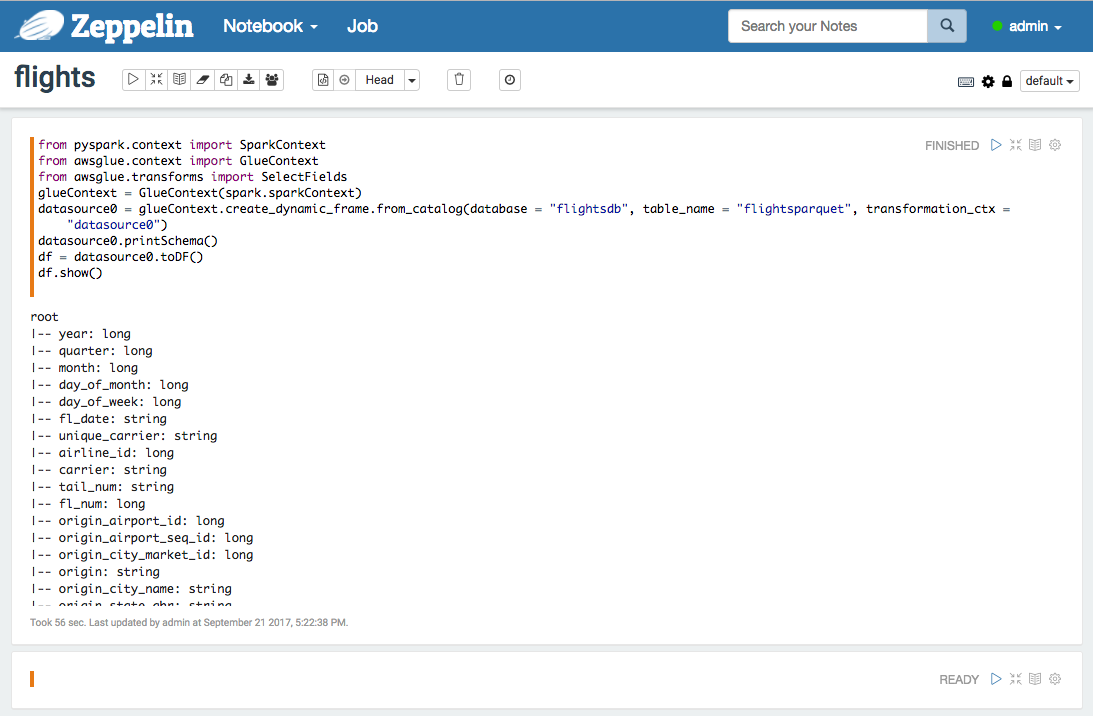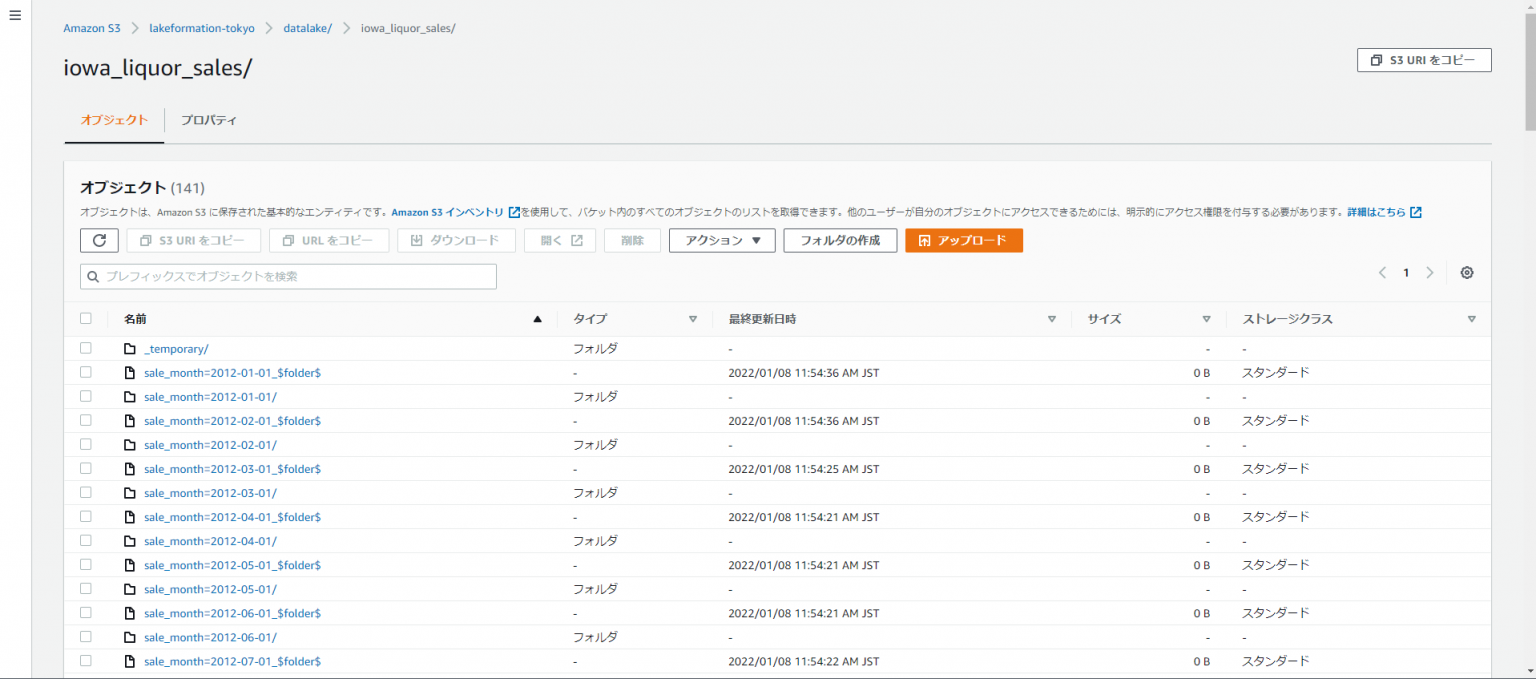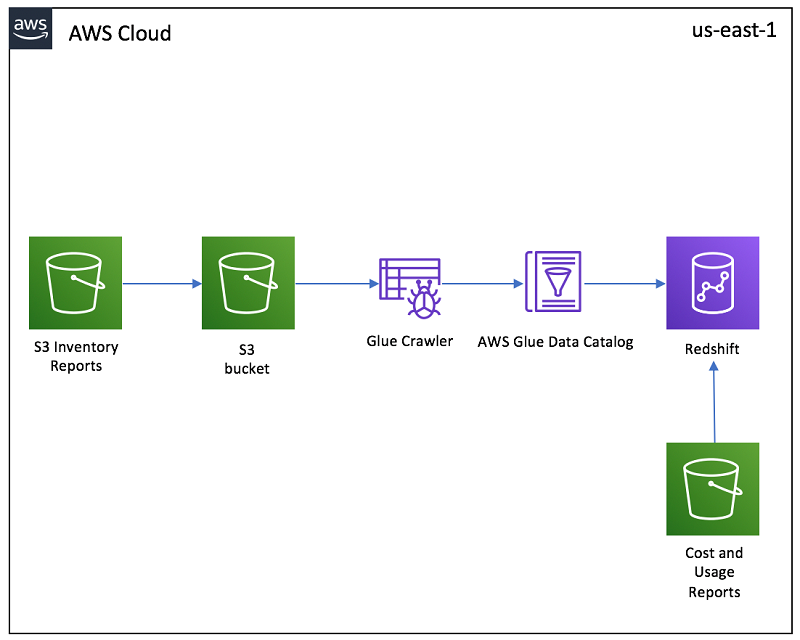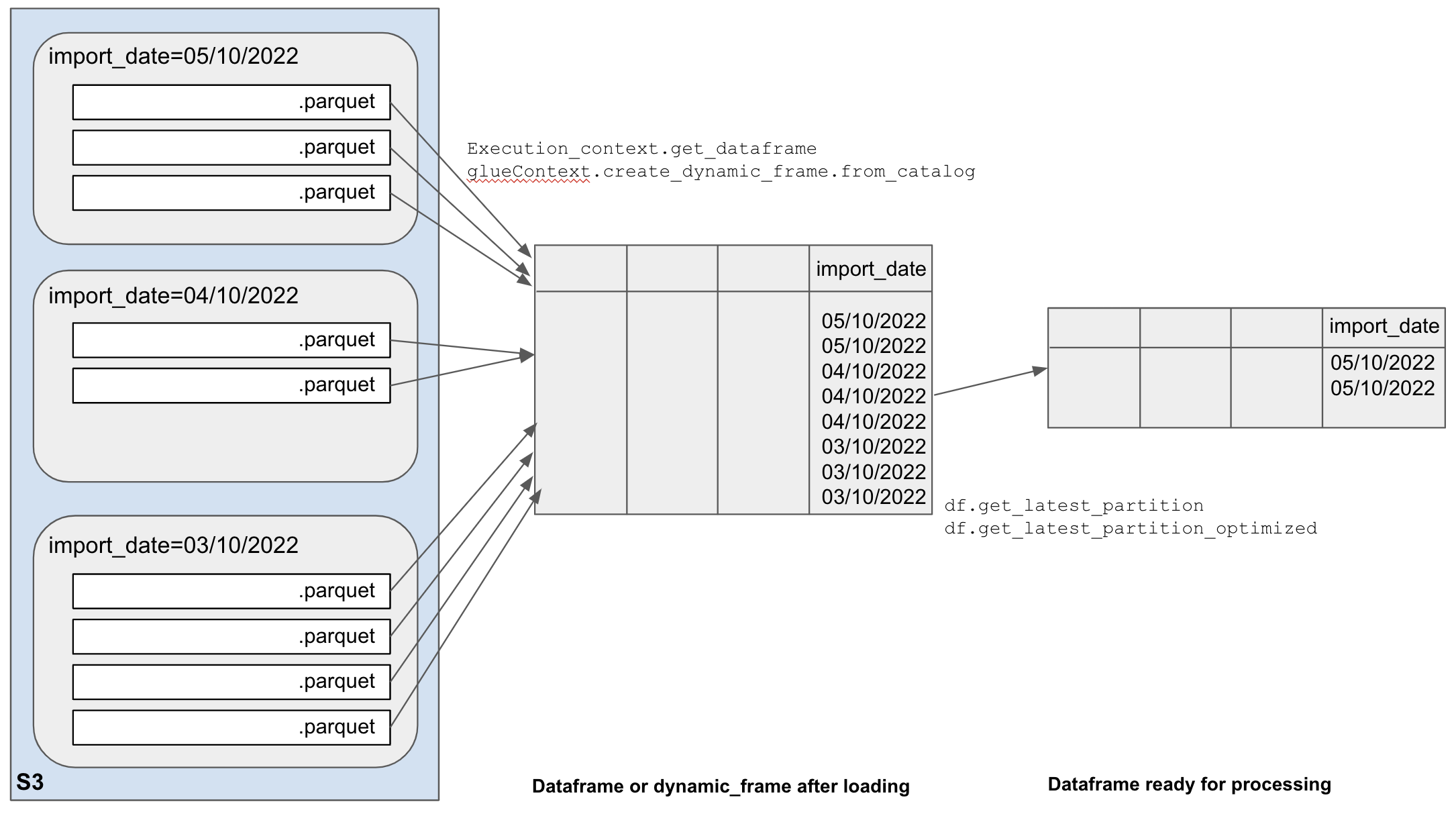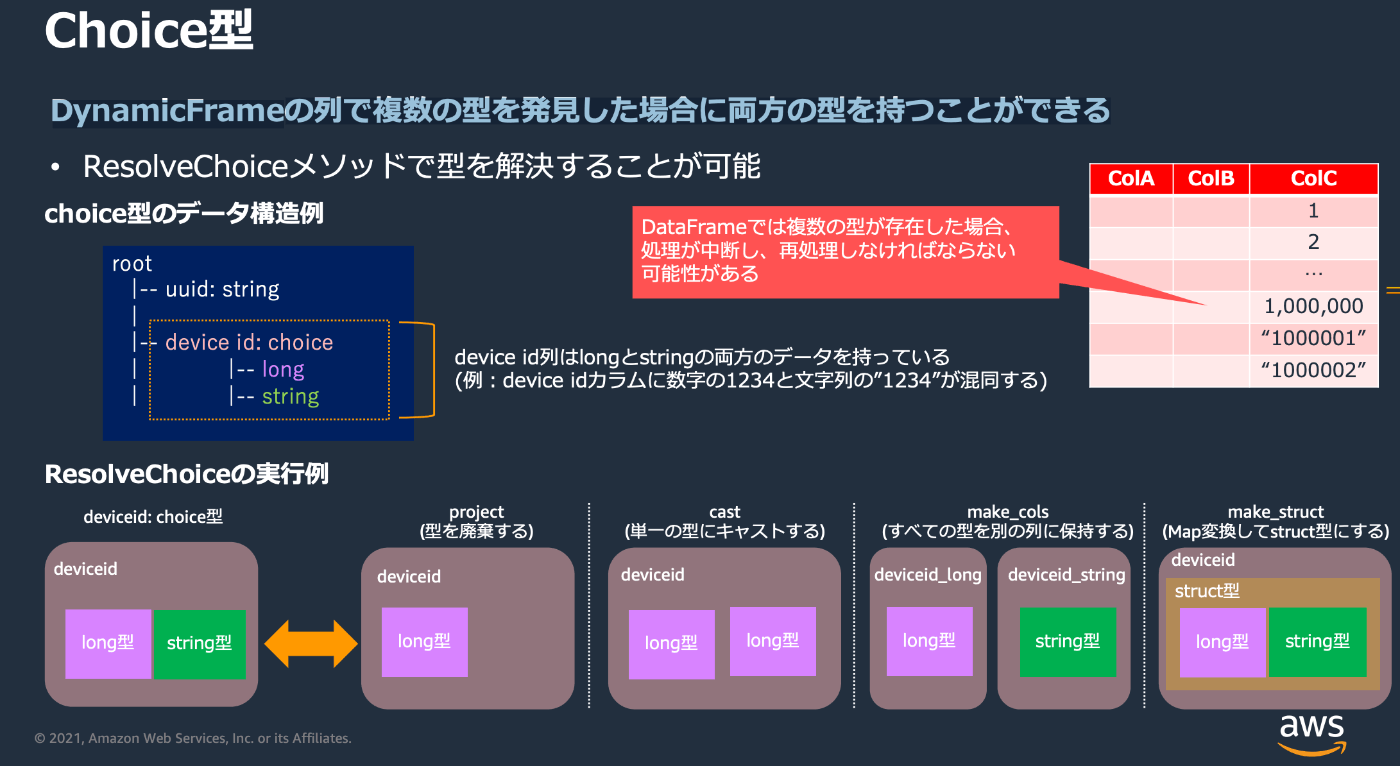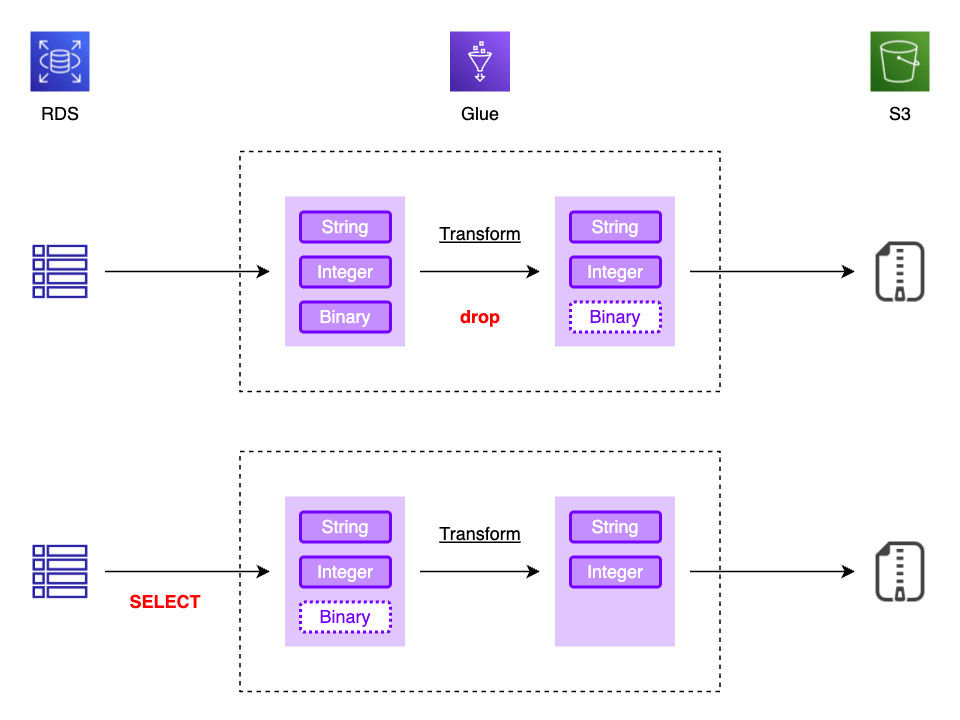Gluecontext.create_Dynamic_Frame.from_Catalog
Gluecontext.create_Dynamic_Frame.from_Catalog - ```python # read data from a table in the aws glue data catalog dynamic_frame = gluecontext.create_dynamic_frame.from_catalog(database=my_database,. Node_name = gluecontext.create_dynamic_frame.from_catalog( database=default, table_name=my_table_name, transformation_ctx=ctx_name, connection_type=postgresql. From_catalog(frame, name_space, table_name, redshift_tmp_dir=, transformation_ctx=) writes a dynamicframe using the specified catalog database and table name. Now i need to use the same catalog timestreamcatalog when building a glue job. Calling the create_dynamic_frame.from_catalog is supposed to return a dynamic frame that is created using a data catalog database and table provided. Then create the dynamic frame using 'gluecontext.create_dynamic_frame.from_catalog' function and pass in bookmark keys in 'additional_options' param. We can create aws glue dynamic frame using data present in s3 or tables that exists in glue catalog. In your etl scripts, you can then filter on the partition columns. However, in this case it is likely. Use join to combine data from three dynamicframes from pyspark.context import sparkcontext from awsglue.context import gluecontext # create gluecontext sc =. Then create the dynamic frame using 'gluecontext.create_dynamic_frame.from_catalog' function and pass in bookmark keys in 'additional_options' param. With three game modes (quick match, custom games, and single player) and rich customizations — including unlockable creative frames, special effects, and emotes — every. We can create aws glue dynamic frame using data present in s3 or tables that exists in glue catalog. From_catalog(frame, name_space, table_name, redshift_tmp_dir=, transformation_ctx=) writes a dynamicframe using the specified catalog database and table name. Node_name = gluecontext.create_dynamic_frame.from_catalog( database=default, table_name=my_table_name, transformation_ctx=ctx_name, connection_type=postgresql. Use join to combine data from three dynamicframes from pyspark.context import sparkcontext from awsglue.context import gluecontext # create gluecontext sc =. In addition to that we can create dynamic frames using custom connections as well. Dynfr = gluecontext.create_dynamic_frame.from_catalog(database=test_db, table_name=test_table) dynfr is a dynamicframe, so if we want to work with spark code in. Datacatalogtable_node1 = gluecontext.create_dynamic_frame.from_catalog( catalog_id =. Create_dynamic_frame_from_catalog(database, table_name, redshift_tmp_dir, transformation_ctx = , push_down_predicate= , additional_options = {}, catalog_id = none) returns a. ```python # read data from a table in the aws glue data catalog dynamic_frame = gluecontext.create_dynamic_frame.from_catalog(database=my_database,. Use join to combine data from three dynamicframes from pyspark.context import sparkcontext from awsglue.context import gluecontext # create gluecontext sc =. With three game modes (quick match, custom games, and single player) and rich customizations — including unlockable creative frames, special effects, and emotes. Because the partition information is stored in the data catalog, use the from_catalog api calls to include the partition columns in. In addition to that we can create dynamic frames using custom connections as well. Use join to combine data from three dynamicframes from pyspark.context import sparkcontext from awsglue.context import gluecontext # create gluecontext sc =. We can create aws. Because the partition information is stored in the data catalog, use the from_catalog api calls to include the partition columns in. Use join to combine data from three dynamicframes from pyspark.context import sparkcontext from awsglue.context import gluecontext # create gluecontext sc =. In your etl scripts, you can then filter on the partition columns. Either put the data in the. From_catalog(frame, name_space, table_name, redshift_tmp_dir=, transformation_ctx=) writes a dynamicframe using the specified catalog database and table name. We can create aws glue dynamic frame using data present in s3 or tables that exists in glue catalog. Calling the create_dynamic_frame.from_catalog is supposed to return a dynamic frame that is created using a data catalog database and table provided. Now, i try to. Gluecontext.create_dynamic_frame.from_catalog does not recursively read the data. We can create aws glue dynamic frame using data present in s3 or tables that exists in glue catalog. From_catalog(frame, name_space, table_name, redshift_tmp_dir=, transformation_ctx=) writes a dynamicframe using the specified catalog database and table name. ```python # read data from a table in the aws glue data catalog dynamic_frame = gluecontext.create_dynamic_frame.from_catalog(database=my_database,. Datacatalogtable_node1 =. Node_name = gluecontext.create_dynamic_frame.from_catalog( database=default, table_name=my_table_name, transformation_ctx=ctx_name, connection_type=postgresql. In your etl scripts, you can then filter on the partition columns. Either put the data in the root of where the table is pointing to or add additional_options =. We can create aws glue dynamic frame using data present in s3 or tables that exists in glue catalog. # create a dynamicframe. Node_name = gluecontext.create_dynamic_frame.from_catalog( database=default, table_name=my_table_name, transformation_ctx=ctx_name, connection_type=postgresql. Now, i try to create a dynamic dataframe with the from_catalog method in this way: We can create aws glue dynamic frame using data present in s3 or tables that exists in glue catalog. Then create the dynamic frame using 'gluecontext.create_dynamic_frame.from_catalog' function and pass in bookmark keys in 'additional_options' param. Datacatalogtable_node1 = gluecontext.create_dynamic_frame.from_catalog(. Dynfr = gluecontext.create_dynamic_frame.from_catalog(database=test_db, table_name=test_table) dynfr is a dynamicframe, so if we want to work with spark code in. However, in this case it is likely. ```python # read data from a table in the aws glue data catalog dynamic_frame = gluecontext.create_dynamic_frame.from_catalog(database=my_database,. In addition to that we can create dynamic frames using custom connections as well. We can create aws glue. Create_dynamic_frame_from_catalog(database, table_name, redshift_tmp_dir, transformation_ctx = , push_down_predicate= , additional_options = {}, catalog_id = none) returns a. Node_name = gluecontext.create_dynamic_frame.from_catalog( database=default, table_name=my_table_name, transformation_ctx=ctx_name, connection_type=postgresql. Now i need to use the same catalog timestreamcatalog when building a glue job. ```python # read data from a table in the aws glue data catalog dynamic_frame = gluecontext.create_dynamic_frame.from_catalog(database=my_database,. From_catalog(frame, name_space, table_name, redshift_tmp_dir=, transformation_ctx=) writes a. # create a dynamicframe from a catalog table dynamic_frame = gluecontext.create_dynamic_frame.from_catalog(database = mydatabase, table_name =. We can create aws glue dynamic frame using data present in s3 or tables that exists in glue catalog. Create_dynamic_frame_from_catalog(database, table_name, redshift_tmp_dir, transformation_ctx = , push_down_predicate= , additional_options = {}, catalog_id = none) returns a. However, in this case it is likely. Node_name = gluecontext.create_dynamic_frame.from_catalog(. With three game modes (quick match, custom games, and single player) and rich customizations — including unlockable creative frames, special effects, and emotes — every. Create_dynamic_frame_from_catalog(database, table_name, redshift_tmp_dir, transformation_ctx = , push_down_predicate= , additional_options = {}, catalog_id = none) returns a. # create a dynamicframe from a catalog table dynamic_frame = gluecontext.create_dynamic_frame.from_catalog(database = mydatabase, table_name =. From_catalog(frame, name_space, table_name, redshift_tmp_dir=, transformation_ctx=) writes a dynamicframe using the specified catalog database and table name. Calling the create_dynamic_frame.from_catalog is supposed to return a dynamic frame that is created using a data catalog database and table provided. However, in this case it is likely. Because the partition information is stored in the data catalog, use the from_catalog api calls to include the partition columns in. ```python # read data from a table in the aws glue data catalog dynamic_frame = gluecontext.create_dynamic_frame.from_catalog(database=my_database,. This document lists the options for improving the jdbc source query performance from aws glue dynamic frame by adding additional configuration parameters to the ‘from catalog’. Either put the data in the root of where the table is pointing to or add additional_options =. We can create aws glue dynamic frame using data present in s3 or tables that exists in glue catalog. Use join to combine data from three dynamicframes from pyspark.context import sparkcontext from awsglue.context import gluecontext # create gluecontext sc =. Node_name = gluecontext.create_dynamic_frame.from_catalog( database=default, table_name=my_table_name, transformation_ctx=ctx_name, connection_type=postgresql. Then create the dynamic frame using 'gluecontext.create_dynamic_frame.from_catalog' function and pass in bookmark keys in 'additional_options' param. In your etl scripts, you can then filter on the partition columns. Datacatalogtable_node1 = gluecontext.create_dynamic_frame.from_catalog( catalog_id =.AWS Glue 実践入門:Apache Zeppelinによる Glue scripts(pyspark)の開発環境を構築する
GCPの次はAWS Lake FormationとGoverned tableを試してみた(Glue Studio&Athenaも
How to Connect S3 to Redshift StepbyStep Explanation
glueContext create_dynamic_frame_from_options exclude one file? r/aws
Optimizing Glue jobs Hackney Data Platform Playbook
AWS Glue create dynamic frame SQL & Hadoop
AWS Glue DynamicFrameが0レコードでスキーマが取得できない場合の対策と注意点 DevelopersIO
AWS 设计高可用程序架构——Glue(ETL)部署与开发_cloudformation 架构glueCSDN博客
AWS Glueに入門してみた
Glue DynamicFrame 生成時のカラム SELECT でパフォーマンス改善した話
Dynfr = Gluecontext.create_Dynamic_Frame.from_Catalog(Database=Test_Db, Table_Name=Test_Table) Dynfr Is A Dynamicframe, So If We Want To Work With Spark Code In.
In Addition To That We Can Create Dynamic Frames Using Custom Connections As Well.
Now, I Try To Create A Dynamic Dataframe With The From_Catalog Method In This Way:
Gluecontext.create_Dynamic_Frame.from_Catalog Does Not Recursively Read The Data.
Related Post:
